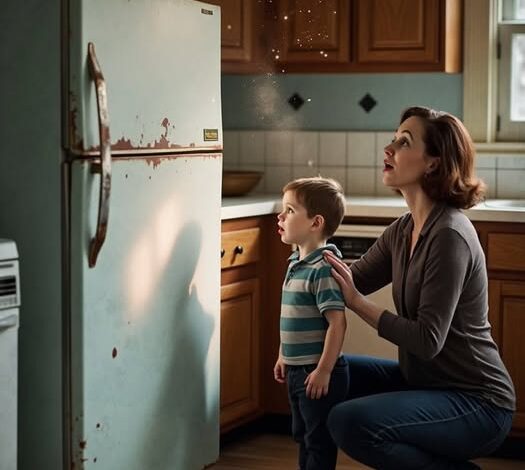The apartment was thick with silence, the kind that presses down on your chest. The faint scent of incense mingled with wilting lilies, lingering reminders of a funeral that had just ended. Mary sat stiffly on the edge of the couch in her black dress, eyes fixed on a worn patch of carpet. Hours earlier, she had buried her grandmother, Eleanor Thompson—the last remaining family she had in the world.
Across from her, Andrew slouched in an armchair, his expression a mask of boredom. He offered no words of comfort. Tomorrow, they were due in court to finalize their divorce, yet he seemed more irritated than sorrowful, as if Mary’s grief were merely an inconvenience.
Finally, he spoke, his voice dripping with mockery. “Well, my condolences. Now you’re the great heiress, right? What did she leave you? Oh, right—an old, smelly refrigerator. Congratulations. Quite the luxury item.”
His words cut her deeply. Eleanor had warned her for years: That man will strip you bare and leave you empty. He’s a crook, Mary. And she had been right. The marriage had been nothing but shouting, insults, and heartbreak. Andrew had drained her spirit until all that remained was emptiness.
He wasn’t done. Straightening his jacket, he smirked. “By the way—you don’t have to bother coming to work tomorrow. You’re fired. I signed the order myself this morning. Soon, you’ll be digging through dumpsters, and maybe then you’ll remember me with gratitude.”
Mary didn’t answer. She had no energy left. She stood, grabbed the bag she had packed the night before, and walked out without another glance.
The cold wind bit at her face as she stepped outside her childhood apartment building, bags heavy in her hands. This place held memories of her parents, who had died in a car accident, and of Eleanor, who had raised her afterward. Mary hadn’t set foot there in years—Andrew had made sure of that. Now, with nowhere else to go, it was all she had left.
Tears finally spilled, hot and unstoppable. That’s when she heard a small voice. “Need help?”
Startled, she turned to see a thin boy of about ten, wearing worn sneakers and a jacket too big for his frame. His cheeks were smudged with dirt, but his eyes were sharp and clear.
“Why are you crying?” he asked bluntly. “Happy people don’t stand in the street with suitcases and cry.”
Mary blinked, taken aback by his directness. “My name’s Sam,” he added, nodding toward her bags. “I can help.”
Something in his steady, understanding gaze made her nod. Together, they carried the bags inside. The apartment smelled of dust and old books, furniture draped in white sheets. Sam set the bags down and said, “This place will take a week to clean—if we work together.”
Mary almost laughed. His seriousness was oddly comforting. And in that moment, she made a decision. “Stay here tonight,” she said softly. “It’s too cold out there.”
Over bread and cheese from the corner store, Sam shared his story. His parents had died in a trailer park fire. He had been shuffled into a shelter but ran away. “They say from there it’s straight to prison. Better the streets. At least I’m my own boss.”
Mary’s heart ached. “That’s not true,” she said gently. “Where you come from doesn’t decide who you’ll be. You do.”
That night, Sam fell asleep on the couch under clean sheets for the first time in months. Mary watched his peaceful face and realized: her life wasn’t over.
The next day, she dragged herself through the divorce hearing. Andrew hurled insults, painting her as worthless. She left court drained, his mocking words about the refrigerator echoing in her mind.
Back at the apartment, Sam fiddled with the old Frigidaire. “Something’s off with this,” he said, tapping its side. One wall sounded hollow, the other solid. Curious, Mary pried at a panel. To her astonishment, it came loose, revealing a hidden compartment.
Inside were stacks of cash, velvet boxes with emerald rings, pearls, and diamond earrings. Eleanor, who had lived through the Great Depression, had never trusted banks. She had hidden her savings in the fridge, knowing Mary might need it one day.
Mary dropped to her knees, tears streaming. Her grandmother hadn’t left her junk—she had left her a second chance.
Clutching Sam, she whispered, “We’re going to be okay. I can adopt you. We’ll have a home. A real life.”
The boy’s eyes shone with hope. “You mean it? You’d be my mom?”
“More than anything,” she said.
Years passed. Mary adopted Sam. They used part of the money to buy a bright apartment, and she built a consulting business. Sam excelled in school, eventually earning a scholarship to the University of Chicago. Mary rebuilt her life too, finding success and even love again.
Nearly a decade later, Sam stood tall in his graduation gown, valedictorian of his class. Mary’s heart swelled as he walked onto the stage. Among the audience sat Andrew, older but still smug.
Sam’s voice was steady. “Once, I was a homeless boy. But a woman, cast aside by her husband and told she’d end up in dumpsters, found me. She became my mother. Today, I thank him. Without his cruelty, I would not be here.”
The crowd gasped and erupted in applause as Sam looked directly at Andrew. “I will never work for a man who destroys lives. My success belongs to my mother.”
Andrew’s face burned red as Sam stepped down to thunderous applause. He hugged Mary tightly, and together they walked out, heads held high.
“Mom,” Sam whispered, grinning, “it’s time you called that professor. You deserve to be happy too.”
Mary smiled through tears. For the first time in years, she felt it—pure, unconditional happiness.
